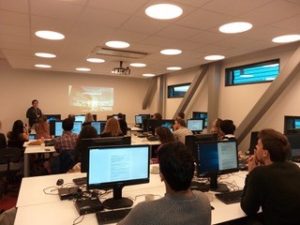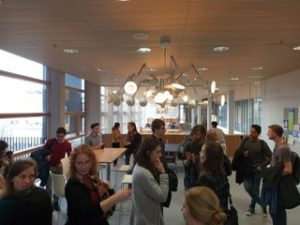On 3rd and 4th December 2019, all NOCI PhD-students and Postdocs traveled to the far north, to the city of Groningen, to participate in a practical training organized by the department of Genetics of the UMCG. After two successful practical trainings organized by the UTwente and LUMC, (Enschede and Leiden, respectively) it was the task for the NOCI people in Groningen to host, introduce and train the students and postdocs from the consortium in their core research topics.
After arrival with tea, coffee and a typical Groninger Martini tower cookie, the scientists were welcomed by Prof. Dr. Sebo Withoff and introduced to our department by showing the department movie and a quick lab- and office tour. When everyone was familiarized with the environment, it was time for the first lecture. As an introduction into one of our research interests, Prof. Dr. Lude Franke gave a seminar about calculating Polygenic Risk Scores (PRS) and how we can combine this knowledge with organs-on-chips.
With this knowledge, it was time to introduce everyone to the in silico working environment where we do our PRS calculations and single cell RNA sequencing analyses: R and Rstudio. Some simple and fun assignments were extracted from the ‘introduction in R’-course, made by Annique Claringbould (PhD student at the dept. of Genetics, UMCG), to get everyone on the same level of experiences with R and its’ language.
The next day, Dr. Monique van der Wijst gave a lecture about the single cell RNA sequencing technique and why it’s such an important improvement over bulk RNA sequencing. Afterwards, the NOCI people started to work on single cell RNA sequencing analyses using a public dataset and a reader to guide them through the analyses.
Lastly, Prof. Dr. Jingyuan Fu was invited to give a lecture about our second genome: the microbiome and the research that is ongoing on this topic at the department of Genetics, UMCG.
The day was concluded with drinks and snacks, when afterwards everyone headed back home, satisfied with new impressions and information that will help to further integrate the interdisciplinary studies within the NOCI consortium


